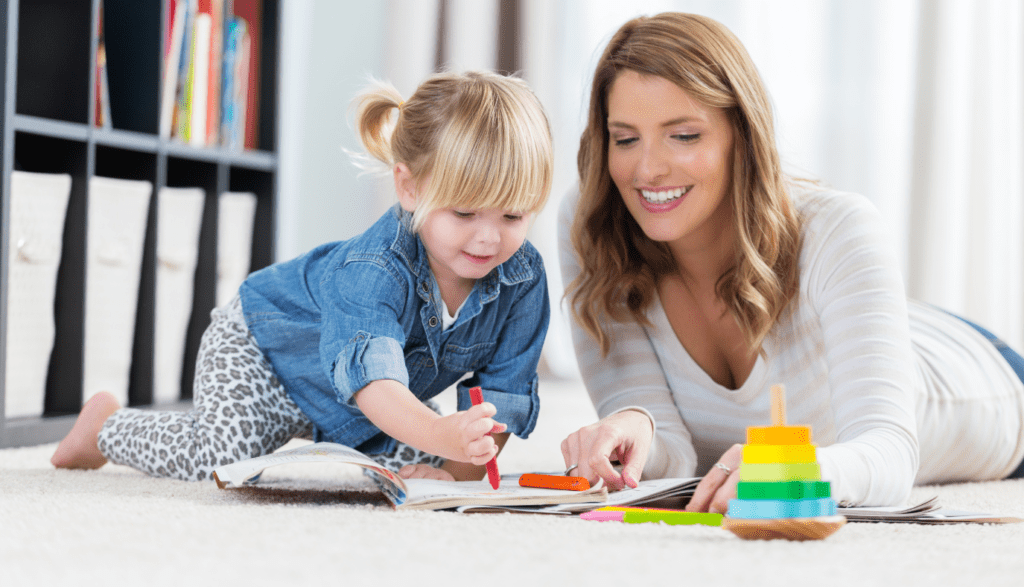How to Be a Playful Mom: 7 Easy Ways to Connect with Your Kids
Let’s be honest—parenting is hard work. Between meals, laundry, tantrums, and trying to keep a house somewhat clean, play can start to feel like one more thing to do.
But learning how to be a playful mom doesn’t mean adding stress to your day. It means embracing joy, imagination, and connection in the little moments—right where you already are.
In this guide, you’ll discover simple, doable ways to bring more playfulness into your parenting style, even if you’re tired or overwhelmed.
Whether your child is a baby, toddler, or preschooler, these strategies will help you slow down, laugh more, and truly connect.
Heads up: This post may include affiliate links. As an Amazon Associate, I earn from qualifying purchases—at no extra cost to you. Full privacy policy and disclosure here.

Why It’s Worth Learning How to Be a Playful Mom
When you intentionally bring a playful spirit into your day, your kids aren’t the only ones who benefit. Playfulness helps reduce stress, builds stronger bonds, and turns ordinary tasks into special memories.
According to Harvard University’s Center on the Developing Child, play supports cognitive, social, and emotional development in young children. It also creates a safe and loving environment where your child feels seen and valued.
1. Redefine What “Playful” Means
Many moms feel pressure to be Pinterest-perfect when it comes to play—but how to be a playful mom is more about your mindset than your crafting skills. You don’t need themed activities or a full playroom makeover.
Being playful might look like:
- Making silly faces while brushing teeth
- Turning chores into songs or races
- Using funny voices when reading stories
- Letting your child “teach” you how to play their favorite game
If you’re still in the newborn phase, check out these 13 ways to play with your newborn for inspiration that requires zero fancy toys.
2. Add a Little Imagination to Everyday Tasks
You don’t need “free time” to play—you just need to sprinkle imagination into daily routines.
- Laundry? Let your toddler match socks and toss them like basketballs.
- Grocery list? Pretend you’re planning a feast for a dragon.
- Brushing hair? Sing a silly made-up song together.
If your child is having trouble engaging with toys, you might also explore these reasons toddlers don’t want to play with their toys.
3. Let Your Child Lead the Play
Sometimes, the easiest way to be playful is to simply follow your child’s lead. Let them choose the activity—even if it seems weird or repetitive.
📌 Pro Tip: Use open-ended toys that encourage creativity and imagination. Here are a few affiliate suggestions to get you started:
- 🧸 Magna-Tiles 100-Piece Set – Perfect for open-ended construction play.
- 🪵 Melissa & Doug Wooden Building Blocks – Durable and ideal for imaginative building.
- 🎨 Crayola Washable Paint Set – Make everyday art fun and mess-friendly.
You can also rotate toys regularly to keep interest high. Need a space to set up? Here’s how to create a baby play area at home that grows with your child.
4. Embrace Sensory and Outdoor Play
Getting outside—even for 15 minutes—can reset your mood and help your child burn off energy. If the weather isn’t cooperating, bring the sensory fun indoors!
Try these low-prep ideas:
- Fill a bin with rice and scoops
- Make oobleck with cornstarch and water
- Do some ice play with toddlers for a cool twist
Recommended sensory toys:
- ❄️ B. Toys Ice Cream Water Table – Great for warm weather.
- 🌽 Kinetic Sand 2 lb Bag – Messy but satisfying fun indoors.
5. Be Silly on Purpose
Sometimes, the best way to lighten the mood is to intentionally act silly. This works wonders when your child is grumpy or stuck in a “no” phase.
Try:
- Talking like a robot while getting dressed
- Pretending to forget how shoes go on
- Playing “sleeping statue” during dinner cleanup
Being playful in moments of stress can shift the energy in your home. If your child resists solo play, these 100 super fun independent play ideas for preschoolers are perfect for quiet time transitions.

6. Use Playfulness to Support Discipline
You don’t need to be strict or permissive. Humor and play can help kids cooperate—without yelling or timeouts.
📌 Try this:
- Instead of “clean up your toys,” say “let’s be toy detectives!”
- Instead of “hurry up,” race to the door saying “who can put on their shoes the fastest?”
Want more structured discipline tools with a playful twist? Positive Parenting Solutions offers a great program with tools that respect both the child and parent.
7. Let Go of the Pressure to Be Fun All the Time
Here’s the truth: You don’t need to be “on” 24/7.
How to be a playful mom also means knowing when not to play. You’re allowed to rest, say no, or hand off the play baton to a sibling, co-parent, or screen when needed.
Sometimes, fewer toys = more play. Check out these 9 reasons why having fewer toys is best for kids—and how it reduces overwhelm for you too.
FAQs About How to Be a Playful Mom
I don’t enjoy playing with toys. Can I still be a playful mom?
Yes! Playfulness can be dancing, storytelling, joking, or pretend play. You don’t need to love blocks or dolls.
How do I balance play with housework and responsibilities?
Invite your child to “help” playfully—turn folding laundry into sock puppets or pretend your vacuum is a monster.
What if I feel too tired or burned out to play?
Rest matters. Even watching a show together with funny commentary can count as playful connection.
Can play help with behavior issues?
Absolutely. Play builds connection, which improves cooperation and reduces power struggles.
What are some quick ways to reset a cranky day?
Try a dance party, flashlight game in a dark room, or a round of hide-and-seek—even 5 minutes can help.

Final Thoughts on How to Be a Playful Mom
You don’t need to be a Pinterest-perfect mom or always know what to do. You just need to be present and open to seeing the fun hidden in the everyday.
Whether you’re making silly voices while cooking, joining in toddler giggles, or watching your preschooler build a fort, your effort to learn how to be a playful mom will leave lasting memories.
Your child doesn’t need perfect. They need you.

